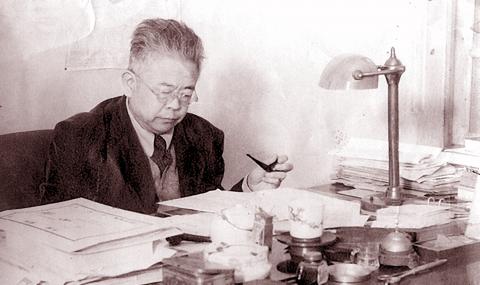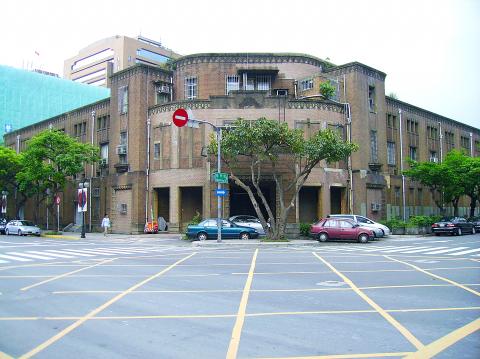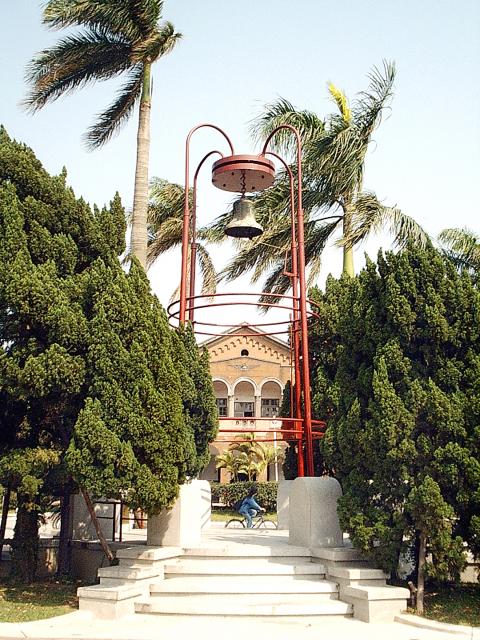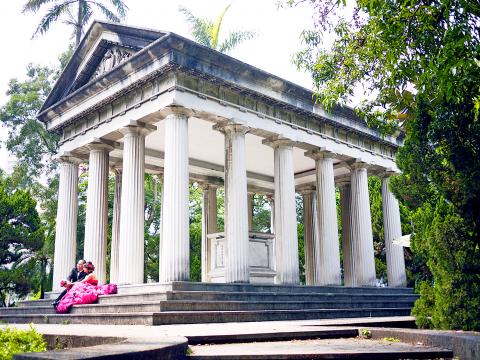Dec. 17 to Dec. 23
Fu Ssu-nien (傅斯年) had just returned to his seat after answering questions from Kuo Kuo-chi (郭國基) at the now defunct Taiwan Provincial Assembly. Kuo had grilled the National Taiwan University (NTU) president on a number of questions, including scholarship funds, to which Fu loudly responded, “I will do all I can to support those students who are poor but talented and intelligent!”
According to the state-run Central Daily News (中央日報), assembly secretary-general Lien Chen-tung (連震東) walked over to shake Fu’s hand, and noticed it was cold. Lien asked if he was okay, and Fu suddenly exclaimed, “I’m done! I’m done!” and collapsed. He died later that night, on Dec. 20, 1950.

Photo courtesy of Wikimedia Commons
Fu was already in poor health, and most sources attribute his death to overwork. But at a press conference the next morning, interim assembly chairman Lee Wan-chu (李萬居) meant to say that Fu qishi (棄世, left this world), but his heavy Taiwanese-accented Mandarin made it sound like qisi (氣死, died from anger). Since Kuo and Fu were both known as “big cannons” (大砲) for their outspoken nature, this led to the rumor that “Big Cannon Kuo caused Big Cannon Fu to die of anger.”
Then-minister of education Chen Hsueh-ping (陳雪屏) was quick to clarify that there were absolutely no tempers lost during the session.
Nevertheless, a furious group of about 400 teary-eyed NTU students marched to the assembly headquarters after paying their respects to Fu’s body. Lien came out to meet them, and asked them what they wanted. “Give us Kuo Kuo-chi!” they demanded. It was only after Lien and Chen clarified the situation and told them Kuo had already left the building, that they walked back to the campus.

Photo courtesy of Wikimedia Commons
This incident shows the respect the students had for Fu, despite only holding his post for less than two years, amounting to his entire time in Taiwan. The landmark Fu Bell (傅鐘) on campus still rings 21 times at the beginning of each class period, as Fu once said, “There are only 21 hours available per day because the remaining three hours are reserved for self-reflection.”
RELUCTANT APPOINTMENT
A student-activist leader in his early days, Fu began his academic career in 1926 with the National Sun Yat-sen University in Guangzhou. He founded Academia Sinica’s Institute of History and Philology in 1928, serving as director as it moved through Beijing, Shanghai, Nanjing, Changsha, Kunming, Sichuan, back to Nanjing and to Taiwan in 1948.

Photo courtesy of Wikimedia Commons
After Japanese defeat, the Chinese Nationalist Party (KMT) took over Taihoku Imperial University, renaming it National Taiwan University in December 1945. Except for Taiwan-born Tu Tsung-ming (杜聰明), who served as interim president for a month in 1948, all early presidents were academics sent by the KMT from China, and Fu was no exception.
By the time Fu arrived in Taiwan, the university had gone through seven presidents in just over three years. His predecessor (not including two interims) Chuang Chang-kung (莊長恭) served for just six months before resigning.
“Because of my lack of ability and support, I barely accomplished anything during my half-year at NTU. I am utterly exhausted and have grown ill as a result, and I don’t have the will to carry on. I’ll be returning to Shanghai to recuperate,” Chuang wrote to Fu.

Photo courtesy of Wikimedia Commons
Chuang never returned to Taiwan, continuing his career under the Chinese Communist Party.
Furthermore, the university was beyond capacity due to the massive influx of refugees from China, many of them school-age family members of KMT personnel.
Fu did not want to take the job. His doctors warned him not to overexert himself, and he was already preoccupied with relocating the collections from the Institute of History and Philology to Taiwan as the KMT faced defeat. He reluctantly accepted after pleas from Tu, Chuang and close friend and then-Taiwan provincial governor Chen Cheng (陳誠).
TRANSFORMING NTU
One of the first things Fu did was to make sure that students could afford to attend. For the ones from China, he convinced the government to support them through funds reserved for students whose homelands had been taken over by the Communists. These students were becoming increasingly concentrated in Taiwan as the KMT lost ground in the war. But these funds only applied to Chinese students, so Fu made sure that the school’s budget included scholarships for Taiwanese with financial difficulties as well. Out of 3,100 students, about 2,200 were attending under some form of financial assistance.
In addition, he was known for his fairness in admission policy, as he refused all “special” requests. He also installed strict requirements for hiring professors, and fired up to 70 “unqualified” staff during his tenure.
Interestingly, up until October 1950, 13 out of 14 students and teachers that were sent abroad to study were born in Taiwan. Fu explains his rationale in several reports, noting that Chinese students had plenty of overseas education opportunities compared to Taiwanese. With the future of China uncertain, he believed that Taiwanese students were more likely to stay and accept a position at the university, hence he gave them first priority, though he noted that “this is likely to change in the future.” He also encouraged women to attend.
Fu prioritized the building of dorms so the students could focus on their studies, as he noticed that some students were living in the classrooms and even the bathrooms.
He was also known for his strong stance during the April 6 Incident, where the police and army raided colleges and arrested students suspected of having Communist ties following a student protest. Fu stood with the students and even challenged Peng Meng-chi (彭孟緝), head of the Taiwan Garrison Command, saying that he would fight him if any students were injured during the raid. After the incident, he also refused to expel any of the arrested students, while National Taiwan Normal University obliged.
Throughout the process, Fu was adamant that NTU remain free of government influence. He gave the students and professors freedom to choose their classes, insisting on a liberal learning environment.
Fu continues to be a symbol of academic freedom until this day. During the political fiasco surrounding the government’s controversial appointment of NTU’s president earlier this year, students boycotted class for 21 minutes under the Fu Bell. Their protest statement contained a quote by Fu: “We shall not allow the university to be used for any purpose other than academics.”
Taiwan in Time, a column about Taiwan’s history that is published every Sunday, spotlights important or interesting events around the nation that have anniversaries this week.
Note to readers:
Due to a scheduling snafu, Taiwan in Time will remain on Sunday.
The features section regrets any inconvenience this may have caused.

April 7 to April 13 After spending over two years with the Republic of China (ROC) Army, A-Mei (阿美) boarded a ship in April 1947 bound for Taiwan. But instead of walking on board with his comrades, his roughly 5-tonne body was lifted using a cargo net. He wasn’t the only elephant; A-Lan (阿蘭) and A-Pei (阿沛) were also on board. The trio had been through hell since they’d been captured by the Japanese Army in Myanmar to transport supplies during World War II. The pachyderms were seized by the ROC New 1st Army’s 30th Division in January 1945, serving

The People’s Republic of China (PRC) last week offered us a glimpse of the violence it plans against Taiwan, with two days of blockade drills conducted around the nation and live-fire exercises not far away in the East China Sea. The PRC said it had practiced hitting “simulated targets of key ports and energy facilities.” Taiwan confirmed on Thursday that PRC Coast Guard ships were directed by the its Eastern Theater Command, meaning that they are assumed to be military assets in a confrontation. Because of this, the number of assets available to the PRC navy is far, far bigger

The 1990s were a turbulent time for the Chinese Nationalist Party’s (KMT) patronage factions. For a look at how they formed, check out the March 2 “Deep Dives.” In the boom years of the 1980s and 1990s the factions amassed fortunes from corruption, access to the levers of local government and prime access to property. They also moved into industries like construction and the gravel business, devastating river ecosystems while the governments they controlled looked the other way. By this period, the factions had largely carved out geographical feifdoms in the local jurisdictions the national KMT restrained them to. For example,

The remains of this Japanese-era trail designed to protect the camphor industry make for a scenic day-hike, a fascinating overnight hike or a challenging multi-day adventure Maolin District (茂林) in Kaohsiung is well known for beautiful roadside scenery, waterfalls, the annual butterfly migration and indigenous culture. A lesser known but worthwhile destination here lies along the very top of the valley: the Liugui Security Path (六龜警備道). This relic of the Japanese era once isolated the Maolin valley from the outside world but now serves to draw tourists in. The path originally ran for about 50km, but not all of this trail is still easily walkable. The nicest section for a simple day hike is the heavily trafficked southern section above Maolin and Wanshan (萬山) villages. Remains of